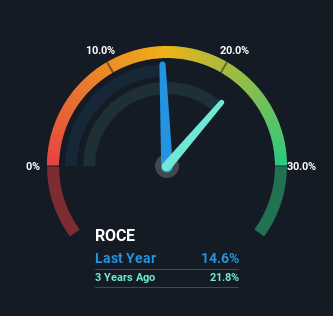The Returns On Capital At Honma Golf (HKG:6858) Don't Inspire Confidence

To find a multi-bagger stock, what are the underlying trends we should look for in a business? One common approach is to try and find a company with returns on capital employed (ROCE) that are increasing, in conjunction with a growing amount of capital employed. This shows us that it's a compounding machine, able to continually reinvest its earnings back into the business and generate higher returns. However, after investigating Honma Golf (HKG:6858), we don't think it's current trends fit the mold of a multi-bagger.
Return On Capital Employed (ROCE): What is it?
For those who don't know, ROCE is a measure of a company's yearly pre-tax profit (its return), relative to the capital employed in the business. Analysts use this formula to calculate it for Honma Golf:
Return on Capital Employed = Earnings Before Interest and Tax (EBIT) ÷ (Total Assets - Current Liabilities)
0.15 = JP¥3.4b ÷ (JP¥37b - JP¥14b) (Based on the trailing twelve months to September 2021).
Therefore, Honma Golf has an ROCE of 15%. In absolute terms, that's a satisfactory return, but compared to the Leisure industry average of 3.7% it's much better.
View our latest analysis for Honma Golf

Historical performance is a great place to start when researching a stock so above you can see the gauge for Honma Golf's ROCE against it's prior returns. If you're interested in investigating Honma Golf's past further, check out this free graph of past earnings, revenue and cash flow.
What Does the ROCE Trend For Honma Golf Tell Us?
In terms of Honma Golf's historical ROCE movements, the trend isn't fantastic. Around five years ago the returns on capital were 52%, but since then they've fallen to 15%. Although, given both revenue and the amount of assets employed in the business have increased, it could suggest the company is investing in growth, and the extra capital has led to a short-term reduction in ROCE. If these investments prove successful, this can bode very well for long term stock performance.
On a side note, Honma Golf has done well to pay down its current liabilities to 37% of total assets. So we could link some of this to the decrease in ROCE. Effectively this means their suppliers or short-term creditors are funding less of the business, which reduces some elements of risk. Since the business is basically funding more of its operations with it's own money, you could argue this has made the business less efficient at generating ROCE.
Our Take On Honma Golf's ROCE
In summary, despite lower returns in the short term, we're encouraged to see that Honma Golf is reinvesting for growth and has higher sales as a result. These growth trends haven't led to growth returns though, since the stock has fallen 38% over the last five years. So we think it'd be worthwhile to look further into this stock given the trends look encouraging.
If you'd like to know more about Honma Golf, we've spotted 2 warning signs, and 1 of them makes us a bit uncomfortable.
For those who like to invest in solid companies, check out this free list of companies with solid balance sheets and high returns on equity.
Valuation is complex, but we're here to simplify it.
Discover if Honma Golf might be undervalued or overvalued with our detailed analysis, featuring fair value estimates, potential risks, dividends, insider trades, and its financial condition.
Access Free AnalysisHave feedback on this article? Concerned about the content? Get in touch with us directly. Alternatively, email editorial-team (at) simplywallst.com.
This article by Simply Wall St is general in nature. We provide commentary based on historical data and analyst forecasts only using an unbiased methodology and our articles are not intended to be financial advice. It does not constitute a recommendation to buy or sell any stock, and does not take account of your objectives, or your financial situation. We aim to bring you long-term focused analysis driven by fundamental data. Note that our analysis may not factor in the latest price-sensitive company announcements or qualitative material. Simply Wall St has no position in any stocks mentioned.
About SEHK:6858
Honma Golf
An investment holding company, designs, develops, manufactures, and sells a range of golf club equipment in Japan, Korea, Hong Kong, Macau, rest of China, North America, Europe, and internationally.
Flawless balance sheet and slightly overvalued.
Market Insights
Community Narratives




